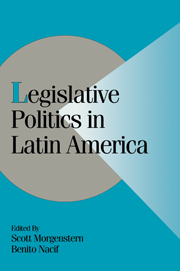Book contents
- Frontmatter
- Contents
- Tables and Figures
- Contributors
- Preface and Acknowledgments
- Party Names and Other Acronyms and Abbreviations
- 1 TOWARDS A MODEL OF LATIN AMERICAN LEGISLATURES
- Part I Executive–Legislative Relations
- Part II Political Parties and Legislative Structure
- Part III Legislatures and the Policy Process
- 10 FISCAL POLICY MAKING IN THE ARGENTINE LEGISLATURE
- 11 PROGRESSIVE AMBITION, FEDERALISM, AND PORK-BARRELING IN BRAZIL
- 12 APPOINTMENT, REELECTION, AND AUTONOMY IN THE SENATE OF CHILE
- 13 THE LEGAL AND PARTISAN FRAMEWORK OF THE LEGISLATIVE DELEGATION OF THE BUDGET IN MEXICO
- Part IV Conclusions
- References
- Author Index
- General Index
10 - FISCAL POLICY MAKING IN THE ARGENTINE LEGISLATURE
Published online by Cambridge University Press: 14 January 2010
- Frontmatter
- Contents
- Tables and Figures
- Contributors
- Preface and Acknowledgments
- Party Names and Other Acronyms and Abbreviations
- 1 TOWARDS A MODEL OF LATIN AMERICAN LEGISLATURES
- Part I Executive–Legislative Relations
- Part II Political Parties and Legislative Structure
- Part III Legislatures and the Policy Process
- 10 FISCAL POLICY MAKING IN THE ARGENTINE LEGISLATURE
- 11 PROGRESSIVE AMBITION, FEDERALISM, AND PORK-BARRELING IN BRAZIL
- 12 APPOINTMENT, REELECTION, AND AUTONOMY IN THE SENATE OF CHILE
- 13 THE LEGAL AND PARTISAN FRAMEWORK OF THE LEGISLATIVE DELEGATION OF THE BUDGET IN MEXICO
- Part IV Conclusions
- References
- Author Index
- General Index
Summary
If political ambition drives politicians, as this volume argues, then legislators should intervene in the policy process in ways that are calculated to advance their careers. In Argentina, due to features of the electoral system that are described in Jones' chapter, the keys to career advancement are held by the leaders of the parties to which legislators belong. In the main, legislators' career prospects are enhanced by toeing the party line on policies endorsed by the national party leadership. However, while Argentine parties are quite disciplined and hierarchically organized around a national political leader, provincial party leaders enjoy substantial autonomy over candidate selection within their own districts. Consequently, in seeking to cultivate ties to both provincial and national party leaders, governing party legislators sometimes face a conflict between the interests of the provinces that they represent and the national party line as it is articulated by the president. To date, scholarship on Argentina has emphasized the extent to which strong national party identities in the legislature undercut legislators' loyalty to their provinces of origin (Frías 1980; Pírez 1986). In contrast, this chapter shows that legislators successfully demanded important changes in the president's fiscal policy proposals in response to some of their provincial concerns. One implication is that the Argentine legislature plays a more relevant though still clearly reactive role than is commonly acknowledged in the literature.
In comparative perspective, since Argentine legislators cultivate relations with both national and provincial party leaders, their electoral incentives combine elements of the Brazilian and Mexican electoral systems.
- Type
- Chapter
- Information
- Legislative Politics in Latin America , pp. 287 - 314Publisher: Cambridge University PressPrint publication year: 2002
- 20
- Cited by

